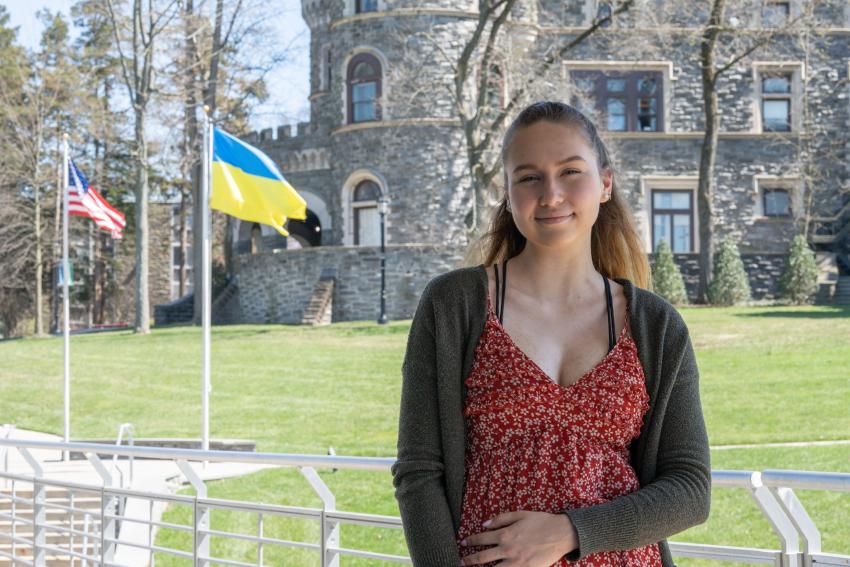Arcadia Community Responds to War in Ukraine

“At Arcadia University, we are deeply troubled by the news and images coming from Ukraine. As a global institution, our hearts are with our students, scholars, faculty, staff, and partners, as well as all those affected by these events in the region and around the world. War and conflict devastate lives and communities for generations, and we hope for peace and justice to prevail.”
The above comes from a University statement from Feb. 28, after Russia invaded its neighboring country. Arcadia has students, faculty, alumni, staff, and friends who are from, have family in, and have studied in Ukraine and Russia. After the invasion began, Arcadia community members came together for educational events and support groups, including a vigil for Ukraine, a panel discussion with faculty members at Arcadia and with the American Graduate School in Paris, and a teach-in on April 1 led by Dr. Angela Kachuyevski, an associate professor of Political Science in the Department of Historical and Political Studies.
Dr. Kachuyevski has taught, published, and presented widely on Ukraine, Russia, and Eastern-European conflict and identity. She researched and lived in Ukraine for many years, even meeting her husband there. Her areas of academic focus include conflict resolution, security studies, minority rights, and divided societies, with a particular focus on conflicts involving Russian-speaking minorities in Ukraine, the Baltic States, and Moldova.
“Putin has been backed into a corner by his own making and choosing,” said Dr. Kachuyevski. “He’s put everything on the line to conquer Ukraine, and I don’t see how he’s going to succeed in doing that. The Ukrainians will not put up with a kind of dictatorship governance, as we have seen.”
Dr. Kachuyevski is finishing a book, based upon extensive field research, about the changing identities of Russian-speaking Ukrainians. “Russian-speaking Ukrainians are Ukrainians,” said Dr. Kachuyevski. “Even before the war began, Ukrainians didn’t believe that Russians would invade them. Many of their identities have been changing since 2017, so on the one hand there was a push for a Ukrainian identity, and another that doesn’t identify with the kind of conflict that you saw in Crimea and Donbas. Still, before the war began, I don’t think people could believe it possible that the Russian military would invade them.”
Vic Fedorko ’22, a senior Psychology major and Public Health minor, is a first-generation American whose family is from Ukraine. While she was born and raised in Chicago, her parents and older sister were born in Ukraine, and she has several family members there.
“We Skype pretty regularly,” she says, adding, “It’s been difficult with their connectivity issues.” She describes the situation her family faces in Ukraine: “It’s heartbreaking. My grandmother talked about how the grocery stores have been raided; dietary staples have been hard to get. It’s also interesting, to say the least, to see the difference between what news organizations are reporting and what my family says.”
The possibility of fleeing has been discussed, Fedorko says, “but my grandparents are quite old, so that journey is not feasible.” She notes that she has male cousins within an age range such that they are required to stay in the country. “I’m still trying to process and understand everything.”
Fedorko hopes to work in a university lab in the Chicago area for a couple of years, learning protocols and beefing up her resume. Research is familiar territory for Fedorko; she conducted COVID 19-related studies with three Arcadia professors, investigating the impact of Zoom use on mental health and body image.

